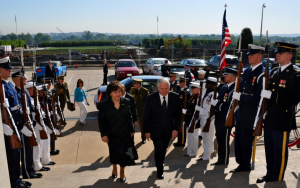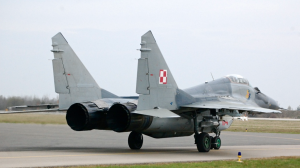
U.S. Secretary of Defense Robert Gates (right) walks up stairs with Lithuanian Defense Minister Rasa Juknevičienė in Washington, D.C. for a meeting between the two last week.
VILNIUS — Lithuania’s Ministry of National Defense announced Friday that the United States is willing to support a permanent NATO airbase in the Baltic states.
Lithuanian Defense Minister Rasa Juknevičienė, who met with U.S. Secretary of Defense Robert Gates last week, said that Gates had expressed his support for a permanent base in the region given that Washington considers the current, temporary mission is considered a [private_supervisor]success. Gates said that the U.S. supported NATO’s position to prolong the Baltic Air Policing mission until at least 2018.
“Robert Gates said that the air policing mission is a successful project and should be continued,” Juknevičienė told Baltic News Service in the U.S. capital.
“The Americans will have a third shift this year. They think they will continue doing this in the future and will urge NATO to make the mission permanent,” she said.
Currently the airbase in Zokniai, near the city of Šiauliai in northwest Lithuania, is used as the alliance’s airbase in the Baltics. Since the three countries lack a capable force of their own, responsibility rotates among NATO members on a six-month basis.

A Polish MiG-29 lands at the Zokniai airbase on Friday as part of NATO's rotating Baltic Air Policing contingent of fighter jets.
Normally four jet fighters are employed to carry out the task. On Friday French Air Force jets rotated out, replaced by four Polish MiG-29s.
From a military standpoint, the airbase holds virtually no tactical or strategic significance, a fact that Russian defense officials have acknowledged, but to the Baltic states the policing mission has vast significance since it shows that alliance membership is more than just participating in summits and meetings and that regional security is taken seriously by the alliance’s civilian and military leadership.
Last year the air policing mission was extended to 2014. Originally, in 2004 when Estonia, Latvia and Lithuania joined the bloc it was thought they would eventually purchase their own more heavy-duty fighters, but due to a variety of factors, not least of all the financial crisis this idea remains unattainable. Currently the Baltic states’ only strike fighters are a handful of L-39s, typically used only for training by the Western military powers.
Juknevičienė also expressed hope that any reduction of NATO’s nuclear weapons in Europe would be met by an equal reduction in Russia’s arsenal. Gates assured her that it would and that no reduction would be undertaken unilaterally, a stance that the bloc’s foreign ministers stressed at their recent summit in Tallinn.
Juknevičienė also said that Gates inquired about the fate of the Mažeikiai refinery, which Russia has said it was ready to purchase from Poland’s PKN Orlen.
In other news, NATO agreed to set up a Center for Energy Security at the General Jonas Žemaitis Military Academy of Lithuania in Vilnius. No cost or personnel estimate has been given yet, but the facility is likely to be of the same size as the NATO Center for Excellence on Cyber Defense in Estonia.
— Baltic Reports reporter James Dahl contributed to this article.
[/private_supervisor] [private_subscription 1 month]success. Gates said that the U.S. supported NATO’s position to prolong the Baltic Air Policing mission until at least 2018.
“Robert Gates said that the air policing mission is a successful project and should be continued,” Juknevičienė told Baltic News Service in the U.S. capital.
“The Americans will have a third shift this year. They think they will continue doing this in the future and will urge NATO to make the mission permanent,” she said.
Currently the airbase in Zokniai, near the city of Šiauliai in northwest Lithuania, is used as the alliance’s airbase in the Baltics. Since the three countries lack a capable force of their own, responsibility rotates among NATO members on a six-month basis.

A Polish MiG-29 lands at the Zokniai airbase on Friday as part of NATO's rotating Baltic Air Policing contingent of fighter jets.
Normally four jet fighters are employed to carry out the task. On Friday French Air Force jets rotated out, replaced by four Polish MiG-29s.
From a military standpoint, the airbase holds virtually no tactical or strategic significance, a fact that Russian defense officials have acknowledged, but to the Baltic states the policing mission has vast significance since it shows that alliance membership is more than just participating in summits and meetings and that regional security is taken seriously by the alliance’s civilian and military leadership.
Last year the air policing mission was extended to 2014. Originally, in 2004 when Estonia, Latvia and Lithuania joined the bloc it was thought they would eventually purchase their own more heavy-duty fighters, but due to a variety of factors, not least of all the financial crisis this idea remains unattainable. Currently the Baltic states’ only strike fighters are a handful of L-39s, typically used only for training by the Western military powers.
Juknevičienė also expressed hope that any reduction of NATO’s nuclear weapons in Europe would be met by an equal reduction in Russia’s arsenal. Gates assured her that it would and that no reduction would be undertaken unilaterally, a stance that the bloc’s foreign ministers stressed at their recent summit in Tallinn.
Juknevičienė also said that Gates inquired about the fate of the Mažeikiai refinery, which Russia has said it was ready to purchase from Poland’s PKN Orlen.
In other news, NATO agreed to set up a Center for Energy Security at the General Jonas Žemaitis Military Academy of Lithuania in Vilnius. No cost or personnel estimate has been given yet, but the facility is likely to be of the same size as the NATO Center for Excellence on Cyber Defense in Estonia.
— Baltic Reports reporter James Dahl contributed to this article.
[/private_subscription 1 month] [private_subscription 4 months]success. Gates said that the U.S. supported NATO’s position to prolong the Baltic Air Policing mission until at least 2018.
“Robert Gates said that the air policing mission is a successful project and should be continued,” Juknevičienė told Baltic News Service in the U.S. capital.
“The Americans will have a third shift this year. They think they will continue doing this in the future and will urge NATO to make the mission permanent,” she said.
Currently the airbase in Zokniai, near the city of Šiauliai in northwest Lithuania, is used as the alliance’s airbase in the Baltics. Since the three countries lack a capable force of their own, responsibility rotates among NATO members on a six-month basis.

A Polish MiG-29 lands at the Zokniai airbase on Friday as part of NATO's rotating Baltic Air Policing contingent of fighter jets.
Normally four jet fighters are employed to carry out the task. On Friday French Air Force jets rotated out, replaced by four Polish MiG-29s.
From a military standpoint, the airbase holds virtually no tactical or strategic significance, a fact that Russian defense officials have acknowledged, but to the Baltic states the policing mission has vast significance since it shows that alliance membership is more than just participating in summits and meetings and that regional security is taken seriously by the alliance’s civilian and military leadership.
Last year the air policing mission was extended to 2014. Originally, in 2004 when Estonia, Latvia and Lithuania joined the bloc it was thought they would eventually purchase their own more heavy-duty fighters, but due to a variety of factors, not least of all the financial crisis this idea remains unattainable. Currently the Baltic states’ only strike fighters are a handful of L-39s, typically used only for training by the Western military powers.
Juknevičienė also expressed hope that any reduction of NATO’s nuclear weapons in Europe would be met by an equal reduction in Russia’s arsenal. Gates assured her that it would and that no reduction would be undertaken unilaterally, a stance that the bloc’s foreign ministers stressed at their recent summit in Tallinn.
Juknevičienė also said that Gates inquired about the fate of the Mažeikiai refinery, which Russia has said it was ready to purchase from Poland’s PKN Orlen.
In other news, NATO agreed to set up a Center for Energy Security at the General Jonas Žemaitis Military Academy of Lithuania in Vilnius. No cost or personnel estimate has been given yet, but the facility is likely to be of the same size as the NATO Center for Excellence on Cyber Defense in Estonia.
— Baltic Reports reporter James Dahl contributed to this article.
[/private_subscription 4 months] [private_subscription 1 year]success. Gates said that the U.S. supported NATO’s position to prolong the Baltic Air Policing mission until at least 2018.
“Robert Gates said that the air policing mission is a successful project and should be continued,” Juknevičienė told Baltic News Service in the U.S. capital.
“The Americans will have a third shift this year. They think they will continue doing this in the future and will urge NATO to make the mission permanent,” she said.
Currently the airbase in Zokniai, near the city of Šiauliai in northwest Lithuania, is used as the alliance’s airbase in the Baltics. Since the three countries lack a capable force of their own, responsibility rotates among NATO members on a six-month basis.

A Polish MiG-29 lands at the Zokniai airbase on Friday as part of NATO's rotating Baltic Air Policing contingent of fighter jets.
Normally four jet fighters are employed to carry out the task. On Friday French Air Force jets rotated out, replaced by four Polish MiG-29s.
From a military standpoint, the airbase holds virtually no tactical or strategic significance, a fact that Russian defense officials have acknowledged, but to the Baltic states the policing mission has vast significance since it shows that alliance membership is more than just participating in summits and meetings and that regional security is taken seriously by the alliance’s civilian and military leadership.
Last year the air policing mission was extended to 2014. Originally, in 2004 when Estonia, Latvia and Lithuania joined the bloc it was thought they would eventually purchase their own more heavy-duty fighters, but due to a variety of factors, not least of all the financial crisis this idea remains unattainable. Currently the Baltic states’ only strike fighters are a handful of L-39s, typically used only for training by the Western military powers.
Juknevičienė also expressed hope that any reduction of NATO’s nuclear weapons in Europe would be met by an equal reduction in Russia’s arsenal. Gates assured her that it would and that no reduction would be undertaken unilaterally, a stance that the bloc’s foreign ministers stressed at their recent summit in Tallinn.
Juknevičienė also said that Gates inquired about the fate of the Mažeikiai refinery, which Russia has said it was ready to purchase from Poland’s PKN Orlen.
In other news, NATO agreed to set up a Center for Energy Security at the General Jonas Žemaitis Military Academy of Lithuania in Vilnius. No cost or personnel estimate has been given yet, but the facility is likely to be of the same size as the NATO Center for Excellence on Cyber Defense in Estonia.
— Baltic Reports reporter James Dahl contributed to this article.
[/private_subscription 1 year]
— This is a paid article. To subscribe or extend your subscription, click here.












